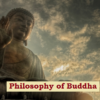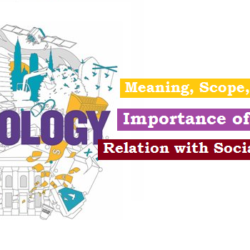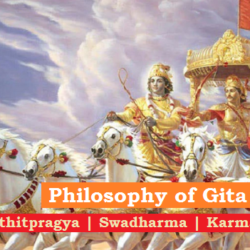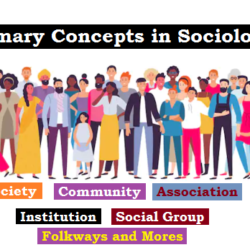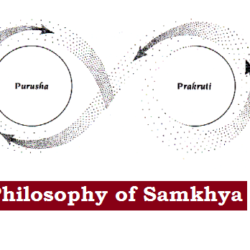
| Philosophy |
| Philos= love: Sophia= knowledge or wisdom |
| Meaning: Meaning love of knowledge |
| दर्शन: दृश= जिसके द्वारा देखा जाए |
It deals with the intellectual exercise concerned with the nature of reality from human perspective.
It is the study of general and fundamental questions, such as those about reason, existence, knowledge, values, mind, and language. Such questions are often posed as problems to be studied or resolved.
Philosophy is considered as the ‘mother of all subjects’ because it has all other disciplines as its subject matter. Historically, the practice of philosophy helped give rise to a wide variety of disciplines, ranging from self-cultivation to political theory to mathematics and the empirical research of the natural and social sciences.
Nature of Philosophy
It makes inquiry into issues emerging in human life and issues that confront human beings- social, political, moral, religion, etc. Its inquiry gains significance in explicating the real meaning or goal of life.
It endeavors to explain through speculative reasoning the possible answers to the mysteries of life. Since each philosopher develops his own answer in accordance to his intellectual caliber we have variety of philosophical truths.
Rational discussions emanate mainly from four perspectives; metaphysical, epistemological, ethical and religious.
1. Metaphysical: transcending the physical realm
- It is concerned with the intellectual analysis of the deep intricacies of the reality. The truth about the ‘reality’ cannot be demonstrated or substantiated, but cannot be denied also.
- The idea of God gains more significance as the ultimate reality.
- Like God, the existence of soul– the sustaining force in human life has been established through logical reasoning.
2. Epistemological: logical theory of knowledge
- It is concerned with deep logical study about the origin of knowledge, its relevance and validity.
- The relationship between human mind and the phenomenal world which culminates in knowledge is analyzed.
- As logic (thought content) forms the basis of all philosophical inquiries. This perspective becomes very significant and immense.
- It is a normative science whose subject matter is studied from the ‘ought to be’ point of view. Logic insists on how one ought to think rather than how one is actually thinking.
3. Ethical: conduct or behaviour
- It is concerned with human conduct which is analyzed as good or bad and right or wrong.
- All the human activities are analyzed from the perspectives of motivation, intention, consequence, etc. resulting in several theories of morality.
- Standard of morality: on which the human conduct is examined
- Plato: knowledge; lack of knowledge will lead to evil.
- Aristotle: golden mean; perfect virtue lies between two extremes.
- Hedonism: all human actions are oriented towards happiness.
- Utilitarianism (Bentham and Mill): greatest happiness of the greatest number.
- Deontological: duty based
- Teleological: based on consequences
4. Religion: supreme reality or God
- It is concerned with establishing an intimate rapport with the Supreme Being or God.
- Philosophy without religion will lead to dry intellectualism (dogmatism). Religion without philosophy will be blind observance (superstition).
- Hence both philosophy and religion are complementary in clarifying the subtle implications of all rituals.
Relation of Philosophy with Religion and Culture
| Religion: a system of thought, feeling, action which gives an individual an object of devotion (regarded as the matter of ultimate concern) |
| Culture: customs and beliefs, arts, way of life and social organization of a particular country or group |
Culture of a people is the totality of their life because their way of life includes their language, tradition, religion, clothing, food, etc. Hence the culture of a people is what gives them their identity as a people.
The concept of religion centers on supernatural power-God, not from an internal experience but based on belief and faith (external revelation).
Philosophy and Religion-Culture are complementary:
Philosophy provides intellectual base to religion through logically explaining the religious beliefs, assumptions and makes it more relevant and scientific. Similarly religion provides significance to philosophy. Philosophy without religion will lead to dry intellectualism (dogmatism). Religion without philosophy will be blind observance (superstition). Hence both philosophy and religion are complementary in clarifying the subtle implications of all rituals.
Similarly culture forms the background for Philosophy and Philosophy is the manifestation of culture.
Philosophy of Religion is rational explications and justifications for religious beliefs based only on reason not faith like that of religion.
Astika Vs Nastika Philosophy
Astika (Sanskrit: asti, ‘there is, there exists’) means one who believes in the existence of a Self/Soul or Brahman, etc. It has been defined in one of three ways:
- as those who accept the authority of the Vedas;
- as those who accept the existence of Self (Atman);
- as those who accept the existence of God.
The six most studied Astika Schools of Indian philosophies (Shaddarshan-षड़दर्शन), sometimes referred to as orthodox schools, are Nyaya, Vaisesika, Samkhya, Yoga, Mimamsa, and Vedanta.
Nastika (Sanskrit: na, ‘not’ + astika) by contrast are those who deny all the respective definitions of Astika; they do not believe in the existence of a Soul or Self.
The four most studied Nastika Schools of Indian philosophies, sometimes referred to as heterodox schools are Buddhism, Jainism, Charvaka, and Ajivika.
Indian Vs Western Philosophy
| Indian Philosophy | Western Philosophy |
| 1. Spiritual in nature (to quench spiritual thirst) | 1. Intellectual in nature (to quench curiosity) |
| 2. Means for the ultimate goal salvation | 2. Knowledge oriented which is end in itself |
| 3. It is highly affected by religion. | 3. It is scientific and philosophy- religion different. |
| 4. Transcends the other world, believes in law of Karma | 4. Deals with this world only. |
| 5. Comparatively lack of freedom | 5. Greater freedom in choosing its topics |

 Home
Home Syllabus
Syllabus Contact Us
Contact Us

